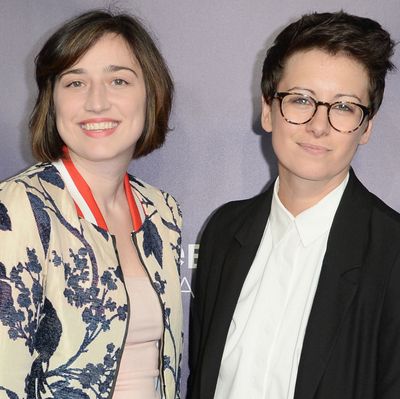
It’s been one hell of a news cycle for Reductress. The site dedicated its entire landing page to rape culture back in 2016, partially in response to how sexual assault was being discussed in the comedy world. Today, every website’s homepage looks like Reductress in 2016: an endless parade of misogyny and poorly thought out thinkpieces. We caught up with founders Beth Newell and Sarah Pappalardo to discuss comedy under Trump, Facebook, and their new podcast, which premieres tomorrow. The Reductress Minute will recap important stories from the site in a style not unlike The New York Times’ Modern Love podcast. It will feature Reductress stories read by luminaries such as Mara Wilson and Patti Harrison, and be hosted by Rachel Wenitsky and a rotating cast of cohosts, including Pappalardo and Newell.
How are you two coping, generally? Getting up every morning and all that.
Beth: I think we’ve all become a little desensitized to it all. Personally, for mental health reasons, I can’t be as plugged in to the news cycle as I was during the election. You can only focus on what you can control.
Sarah: I’m the same way. I’m trying not to sweat the small stuff that would have irked me a year ago, and I think that applies to everything. There are still big fights to fight and big conversations to have, so focus on the big stuff.
How is it different to parody current events and media while having to disengage from it for self-care reasons?
Beth: We have our certain access point on the news, which is a little bit different from what other people are doing. It is more the way the news affects us culturally and how the media is having a conversation around the news and less what that news is, specifically. So a lot of times, it doesn’t require us to be as up-to-the-minute involved in the minutiae of every single story. We’re more interested in talking about the way the media handles assault allegations as a whole and how that might be playing out in a specific story, but we’re not here to tear down a specific person.
Sarah: And that allows us to disengage from the small news, like what Trump’s wig did yesterday, and focus more on the larger themes that are coming from the media instead.
It really is a new person being accused of sexual misconduct every day. How has that affected your work?
Beth: I would say some are more exhausting than others. Media stuff is a little closer to our hearts, being involved with comedians and the entertainment industry. It hits a little closer to home. Because we were doing our rape culture homepage takeover back in 2016, I think we’ve been dealing with different allegations within our comedy communities for a while now. It’s not nearly as much of a shock to us now. It’s sort of part of the grind now.
Sarah: At this point, it’s kind of the same deal as the rest of the news in that a lot of these stories are very very similar. The stuff that jumps out at us are the nuances that are part of a larger conversation and how we’re going to move forward from here. It’s less about the day-to-day million men that are being accused of being harassment and assault and more the bigger themes coming out of this discussion.
I think one of the weirder themes coming out of this is a call for nuance in response to arguments that are already very nuanced.
Beth: Yeah, I often find people are misreading the article. You’ll present them with an article where the man was not accused of rape, was accused of being inappropriate in other ways, and then they’ll be like “He’s not a rapist!” And no one said he was. Why is this being brought up? But I think people will always tone police and will always find the most insane member of a movement to try to scapegoat the entire movement as being crazy. There’s always going to be someone out there who’s a little too reactionary, and that’s who they’re going to claim is representative of the entire movement.
Tell me more about the new podcast.
Sarah: It’s a weekly podcast, hosted by one of our editors Rachel Wenitsky and a rotating cast of guest hosts including ourselves and other in-house contributors. We’re going to do weekly rundowns of our favorite Reductress articles of the week, our favorite headlines, and topical bits around things that are going on in the world. But best of all, it’s short. It’s less than 30 minutes, so it’s going to be a quick digest of what you see on Reductress.
That’s going to be markedly different from Mouth Time, which seemed quite labor-intensive.
Beth: This will be us as ourselves, more or less. We’re still doing bits, obviously. Mouth Time was in-character, and required a lot more scripting and planning in advance.
Sarah: We still love Mouth Time and will be doing it on occasion. But there was definitely still a hole that we thought we wanted to fill, in terms of bringing what you see on the site into audio form for those of us who drive and can’t always read.
It also seems like a good idea because online journalism and writing is allegedly dying. Have you changed anything to cope with this emerging landscape?
Sarah: Fortunately, we’re like water bears. We’re kind of too small to die. Everything Matt [Klinman] said in the previous article was 100 percent on-point. There are definitely some other dimensions to the conversation that also factor into why media has been hurting in the past couple years, and especially in the last year. Facebook is a huge part of that. A lot of companies poured a lot of money into building this platform that they don’t technically own. Building a following on Facebook, that’s something that theoretically can be taken away from you at any point, as opposed to a newsletter subscription base or even a Twitter following. So, yeah, the algorithm affects all of us, but even beyond that, advertising fell through the floor. And that is definitely affecting things, too. Any time you click on Reductress or any site, on average they’re earning a lot less per view than they were in 2013. That’s due to ad blockers and the pool of sites having gotten bigger, and people trying to game the display ad system. The same thing happened with branded content, where BuzzFeed was killing the game and a lot of people followed suit. But then there were just so many options and fields that no one could guarantee that they could survive on branded content. There was no guarantee that there would be another one coming next quarter. So there’s a lot to it beyond Facebook, but Facebook having all this control is definitely an issue.
Speaking of branded content, if you could partner with anything, what would it be?
Sarah: Like a brand?
If you want to partner with a nonprofit or an abstract construct, that’s totally fine.
Sarah: My favorite abstract construct is the Kardashians.
Beth: We’re partnering with female empowerment. [laughter] I think we have lightly partnered with a sex toy store. Stuff like that is always on-brand.
Sarah: Basically, people who seek us out are usually brands that get our vision, and not usually Procter & Gamble.
Speaking of the Kardashians, how’s the Kylie baby news cycle treating you?
Beth: Unfortunately, we’ve had an insanely busy month and haven’t been following her baby as closely as we like. I had to skim through that video and catch the highlights, but it seems like she’s doing well.
I teared up, which is not something I expected to happen.
Beth: I had the same reaction. I think any woman delivering a baby is an emotional moment, but I don’t know why it resonated with me so much.
In her announcement, she said her pregnancy and giving birth was the most empowering experience she ever had. That word gets bandied around a lot. What does empowerment mean to you?
Beth: I think childbirth is definitely empowering. I don’t want to go too far down a rabbit hole of my views on childbirth. I have a lot of strong feelings about it, as a mom. It’s something I’m always lecturing people about. There’s a break between the way things are actually empowering versus how empowerment is represented in the media as “slap on this face cream” or whatever. For something to pay off, it usually involves a lot of effort being put in. So that’s why I feel like something like childbirth is empowering, because it’s not an easy task. A lot of things are empowering. Quitting your job is empowering, setting boundaries with people is empowering.
Sarah: I just want to hear like one guy say that he’s empowered, though. Just one man saying anything is empowering.
When you talk about what’s empowering, you’re implying that before you were de-powered. That could be why it doesn’t come up so much.
Sarah: It must be crazy to just be born empowered. Must be nice.
How do you parody or satirize things that you find displeasing in media without becoming those things? How do you stare into the abyss without it staring into you?
Beth: It can be tough. We try to satirize things without putting other women down, and that can be a little tricky when certain people are doing really insane things in media. We try to find a unique angle on something and a broader angle hopefully that points to a larger problem than that one person. We try not be too inflammatory or triggered by anything in the moment. Sometimes we have to process our frustration then come up with jokes.
Sarah: And a lot of it is just being as specific as possible in our satire, especially when it’s on touchy subjects or specific people. We’re not out to broadly demonize most women or people that we criticize, so we try to make sure our writing is specific and tight and not just a broad demonization. Unless it’s deserved.
Reductress does a good job of including diverse voices—people of color, queer people, trans people—but the thing you’re parodying doesn’t. How do you negotiate being inclusive when the object of satire is not?
Beth: That can be a bit of a challenge, but mostly we just let people of those demographics pitch us ideas. We like original ideas.
Sarah: The reality of digital media right now is that even the stuff that is tone deaf, off-base, or wrong is often still coming from the best intentions possible. It’s people we know who are writing this stuff sometimes, and then their headlines get rewritten in editorial or something like that. So we’re here to shed light on the process that can make things seem super heteronormative or transphobic, knowing full well that the people who write things that are heteronormative stuff aren’t necessarily homophobic. They just have this massive blind spot and think that they’re doing something good by finally acknowledging queer people. We try to address it with a certain amount of understanding.
That’s, again, a more nuanced response and with more empathy than one would expect. Especially from internet culture.
Sarah: If you’re a queer person or a person of color and work in this field, you’re going to see the machinations behind it. It’s a systemic problem. But I really do think that a lot of people in media right now are really working with the best of intentions but don’t always get it right.
The first episode of The Reductress Minute premieres tomorrow.





